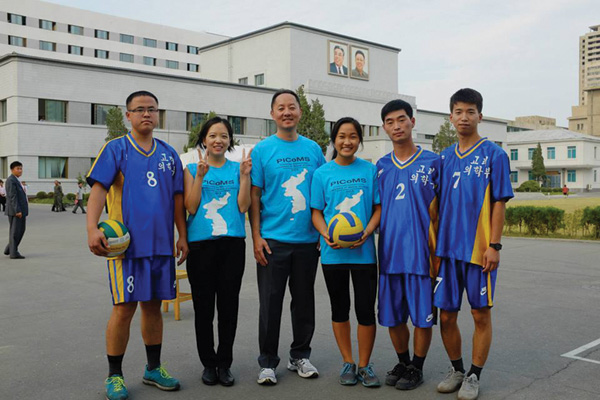Pictured above: Wearing their light blue jerseys, Liz Park, Dr. Mike Yoon and Sophie Park (l-r), stand between North Korean medical students after a friendly volleyball match. (All photos courtesy of Liz Park, Credit: Josiah Cha)
by LIZ PARK
Stop any layperson on the street in the United States and ask them the first words that come to mind when they think of North Korea. Health care, humanitarian aid and development would hardly rank high up there.
North Korea, or the Democratic People’s Republic of Korea as it is formally known, has long been shrouded under a veil of mystery in regards to its state of health care and socioeconomic development. Beyond the mercurial politics of the North-South Korean border, the tense nuclear standoff and public fascination with the hermit kingdom, the people of North Korea face critical health care concerns, from chronic undernutrition to tuberculosis to other noncommunicable diseases, which contribute to two-thirds of all deaths in North Korea, according to the medical journal The Lancet.
As a South Korean-born, naturalized U.S. citizen and medical student, I got to witness some of these issues firsthand when I traveled to North Korea with the Korean American Medical Association (KAMA) for the first time in May 2014.
The KAMA North Korea Doctor to Doctor Initiative has been recruiting Korean American physicians in the U.S. for biannual medical service trips to Pyongyang since 2007. Spearheaded by Dr. Kee Park, a Korean American neurosurgeon based in Cambodia and the global health chair of KAMA, the medical service trips incorporate specialists in such fields as neurosurgery and pediatric plastic surgery, along with public health initiatives, technical support and capacity building, including the delivery of medical equipment, training of health care workers and medical education lectures given by specialists.
 The Pyongyang Medical Center operating room. At center is Dr. Mike Yoon, wearing dark glasses and holding a surgical instrument.
The Pyongyang Medical Center operating room. At center is Dr. Mike Yoon, wearing dark glasses and holding a surgical instrument.
At its core, the Doctor to Doctor Initiative is about fostering peaceful, academic and service-driven engagement with North Korea. Specialists hop on board to operate on local patients while nurses and other ancillary staff offer their assistance. This perhaps is no different than other short-term medical service trips led by public health organizations.
However, our doctors are able to connect with North Korean health care staff as one human being to another because of our shared heritage. Since May 2013, these service trips have expanded to include medical students such as myself.
Last September, we launched the first annual PICoMS (Pyongyang International Conference of Medical Students) at Pyongyang Medical College.
The objective of this student-focused conference was to exchange medical information, achievements and solutions among medical students of Korean heritage. We also hoped to engage our North Korean counterparts on dialogue around health and socioeconomic development in their country. Through PICoMS, I had the rare opportunity to interact intimately with North Korean medical students.
Myself and three other students from the U.S., plus Dr. Park’s daughter, presented on such topics as the U.S. health care system, U.S. medical education and how to be a successful doctor, while North Korean medical students educated us on the North Korea health care system, North Korea medical education, traditional Koryo medicine and the history and current status of neurosurgery. A total of 85 Pyongyang Medical College students attended the conference.
Any chance they had, the North Korean medical students peppered us with questions, which extended beyond topics of medicine to U.S. politics, religion and even entertainment.
Their questions even touched on Americans’ habits and the everyday mundane. They asked me how medical students in the U.S. deal with pressure. They asked how we decompress and what we do in our leisure time. One female student even asked how Western girls diet and sought out helpful tips (it seems that even in North Korea women develop self-critical body images).
 A group photo of those who participated in the 2014 medical conference in North Korea.
A group photo of those who participated in the 2014 medical conference in North Korea.
Recently, as I prepared to head out on my second trip for this conference in May, I reflected on my first visit. As a newcomer to the weeklong medical service trip to Pyongyang, I struggled to find my place as a mere student, unable to assist the physicians on this trip in any tangible way.
Furthermore, in witnessing the North Korean health care staff’s valiant efforts to deliver care in the midst of extreme resource deprivation, I lamented the fate of the two Koreas. Would we ever have a chance to heal these long-carried scars of war and bridge political and ideological schisms?
I recalled the voices of the North Korean students that rose with excitement as they discussed a scenario of reunification. For the first time since arriving, I felt we had a shared vision as fellow Koreans—not as Communist vs. Imperialist or North Korean vs. American—but simply as Koreans.
North Korea is a country divided in body but unified in spirit with South Korea. To take steps towards resolving political strife and tension, one must first engage the people. As Korean Americans, our responsibility is unique: we can go where most South Koreans cannot. We share “Korean” sentiments yet carry a U.S. passport. There is tremendous potential for the development of healthy and rigorous academic and professional exchange and to serve as ambassadors in promoting such a relationship.
Each trip to North Korea for me is an opportunity to expand and transform my heart, by shedding its former prejudices and fears to share my life’s blessings with fellow Koreans.
This is why I continue to go back, and why I will keep going back.
Recommended Reading
“Uri Tours Focuses on North Korea Tourism”
“Photographer Aram Pan Presents a Different Angle to North Korea”
Liz Park is a graduating student at Boston University School of Medicine and an incoming internal medicine intern at Cornell-New York Presbyterian Hospital. If you are interested in the KAMA trips or PICoMS, please contact kama.projectdprk@gmail.com.
___
This article was published in the April/May 2015 issue of KoreAm. Subscribe today! To purchase a single issue copy of the April/May issue, click the “Buy Now” button below. (U.S. customers only. Expect delivery in 5-7 business days).







